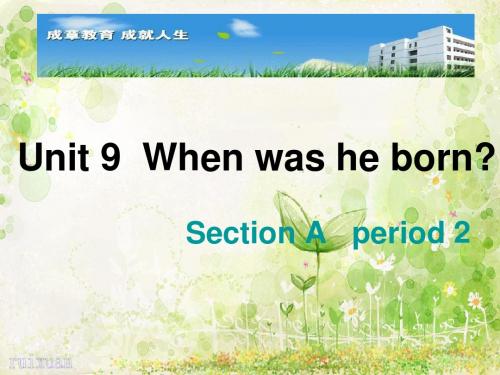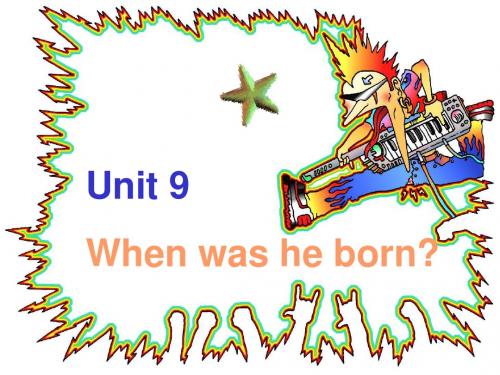unit9whenwasheborn1doc初中英语
- 格式:docx
- 大小:10.24 KB
- 文档页数:4



初二英语Unit 9 When was he born? 人教版(新目标)【本讲教育信息】一. 教学内容:Unit 9 When was he born?[学习过程]一. 教学目标:1. 谈论自己崇拜的名人;2. 学习一些有关职业的英文表达方式;3. 谈论自己过去的生活经历;4. 谈论自己和别人的成就;5. 能够写一篇短文,介绍自己和周围同学的生活经历;6. 学习写一篇简短的人物传记。
二. 语言结构:1. 被动语态2. When引导的状语从句3. When / How long 引导的特殊疑问句三. 重点词汇1. achievement n. 成就、功绩2. skater n. 溜冰者3. champion n. 冠军4. great adj. 伟大的5. born(动词bear的过去分词)出生6. star n. 星星、明星7. violinist n. 小提琴手8. movie star 电影明星9. golf v/n. (打)高尔夫球10. sneeze v/n打喷嚏11. hiccup v/n打嗝12. start v. 开始13. stop v. 停止14. talented adj. 有天赋的、天才的15. loving adj. 慈爱的16. creative adj. 有创造力的17. outstanding adj. 杰出的、出色的18. unusual adj. 不寻常的、独特的19. famous adj. 著名的四. 重点短语1. ping-pong player 乒乓球运动员2. basketball player 篮球运动员3. tennis player 网球手4. take part in 参加5. start doing / start to do 开始做…6. at the age of 在…岁时7. receive an honor 获得荣誉8. win the first prize 获得一等奖9. a piece of music 一段音乐10. a professional basketball player 一名职业篮球运动员五. 重点句子1. Who is that?那是谁?2. That’s Deng Yaping. She is a great ping-pong player.那是邓亚萍,她是一名伟大的乒乓球运动员。

【英语】八年级上册教材全梳理(Unit 9 When was he born)知识•巧学•升华巧解生词【词析】音析:ear读。
形析:b+ear(耳朵)【例句】 She was born in China.他出生在中国。
【拓展】(1)过去分词:born(2)短语:be born in(on)出生于; be born in one's mind 牢记在心It must be born in your mind that you are a Chinese.你必须牢记在心,你是一个中国人。
【词析】音析:or读形析:re + cord(绳索、束缚)【例句】 Jim has the hiccuppingworld record. 吉姆保持着打嗝的世界记录。
【拓展】(1)同根词:recorder n.录音机(2)短语:keep the record保持记录;break the record打破记录【词析】音析:第一个元音字母a读。
形析:nation(国家)+-al(形容词后缀)【例句】 We refuse to sign any treaty that is against our national interests. 我们拒绝签署任何有损国家利益的协议。
【拓展】(1)同根词:nationalism 民族主义(2)短语:national anthem 国歌【词析】音析:o读。
形析:be(是)+e(来)【例句】 He hopes to bee an engineer when he grows up.他希望长大后当一名工程师。
【拓展】(1)过去式:became(2)短语:bee interested in 对……感兴趣如:Most children bee interestedin puter games.大多数的孩子对电脑游戏感兴趣。
【词析】音析:元音字母a读。
形析:c+all(所有的)【例句】 You can call me Matthew. 你可以叫我马太。

初二英语Unit 9 When was he born?【本讲主要内容】Unit 9 When was he born?通过本单元的知识学习,我们应达到以下目标:1. 掌握谈论一些特殊人物情况的用语、句型,when引导的特殊疑问句的一般过去时。
2. 能够以一些名人的照片和简介为材料进行谈论,听说读写全面训练。
3. 通过了解优秀人物的事迹,学习他们的精神,激发同学们学习积极向上,争做为社会贡献的有用人才。
【知识掌握】本单元的语言功能是“谈论卓著超常的人”(Talk about exceptional people)。
以谈论话题“people you admire”为中心,主要用以谈论在社会生活中成绩卓著超常的著名人物学习和运用被动语态,状语从句等。
要求学生掌握以下目标语言:Who is that? That’s …She /He is a …When was she/ he born? She/ He was born in …When did she /he become …? When she/ he was …years old, she /he began to learn…How long did she/ he …?【知识点精析】1. take part in/ join这两个词的共同意思时“参加”,其主要区别是:take part in 多指“参加(讨论、辩论或群众性活动)”,如:John takes part in many school activities.约翰参加很多学校里的活动。
It’s very likely that the president will take part in our discussion.很可能总统会参加我们的讨论。
The students took an active part in the spoken English competition.同学们积极参加英语口语比赛。

unit9《whenwasheborn》复习知识精讲(人教新目标初二)doc初中英语I.应把握的词组:1. ping-pong player乒乓球运动员2. a great Chinese ping-pong player中国杰出的乒乓球运动员3. start hiccupping 开始打嗝4.too… to…太…….而不……5.write music谱写曲子6.a movie star电影明星7. learn to ride a bicycle学会骑自行车8.start learning开始学英语9.begin playing sports 开始进行体育运动10. a loving grandfather慈爱的祖父11.spend all one’s free time with sb.与某人一起度过了所有的业余时刻12.a famous violinist 闻名的小提琴手13. ice skating滑冰14.a kind and loving grandmother和气而慈爱的祖母15. a skating champion 滑冰冠军16.the famous Chinese pianist中国闻名的钢琴演奏家17. a small boy(girl)孩提时期18. at the age of…在……年龄时19.take part in参加、加入20.begin to learn the accordion开始学习手风琴21.major in 主修,专修22. start for a place=leave for a place动身去……23.because of 因为、由于II. 应把握的句子:1.When was he born?他是什么时候出生的?翻译:你弟弟是什么时候出生的?邓亚萍是什么时候出生的?她是1973年6月2日出生的。
乔丹是在哪出生的?他出生在美国。
2.Who’s that? That’s Deng Yapi ng. She is a great Chinese ping-pong player.那是谁?是邓亚萍。
unit9whenwashebornldoc 初中英语
Practice 1
作业导航:
连续学习一样过去时态及其各种句式,并能熟练地对过去的情况进行表达和谈论。
I •单项选择
I.Where ___________ you born? A. did
B. had
C. was
D. were
2.Do you enjoy work ing? Yes, I do. I like
A. busy
B. very much
C. keep ing busy
D. busy 3.May I ask you questi ons?
A. a little
B. any
C. some
D. a
st ni ght my father
home very late.
A. reached
B. gets
C. reached to
D. got to 5.Whe n Jim was a child, they
to France.
A. lived
B. worked
C. reached
D. moved
6.— _________ go and see the baby pan das?
—Good idea.
A. Let's
B. Can you
C. Shall we
D. Do we
7. Happy New Year!
A. OK.
B. How do you do?
C. The same to you
D. How are you?
8.—How often are you ill? A. Last week B. Sometimes C. Three days
D. Less tha n a week
9.Wei Hua a busy day yesterday.
A. has
B. had
C. was
D. have
10.When you come here? We here last week.
A. do; come
B. do; came
C. did; came
D. did; come
n .完成对话
(A is a new stude nt. Mr. Wang is ask ing him some questi on s.)
W: You are new here, am I right? A: Yes, you are right, Mr. Wang. W: 1 ? A: Yes, please. W:
2
A: On July 14, 1983. W: Where were you born? A: I W: was born in Sydney in Australia. 3 ?
A: For about eight years. W: And 4
?
A: They were born in Sydn ey, too.
W: Are they living in China?
A: 5 . He is coming soon.
川.阅读提高
Roberto Clemente was a great baseball (棒球)player. In fact, he was a star. He could jump to catch a ball. He could run fast .And he could hit a ball hard.
Roberto Cleme nte loved childre n. He wan ted to build a park for the childre n of Puerto Rico.
In 1972, Roberto was killed in an airplane, but people did not forget him. They sent money for the park. In 1975, the park was opened. Roberto Clemente's dream (妄图)had come true (实现).
Comprehension questions :
1. Roberto Cleme nte was killed in ________ .
A. a car
B. a baseball game
C. an airpla ne
2. This story tells about _________ .
A. a kind baseball star
B. Roberto Cleme nte's team
C. poor childre n
3.ln the first part of the story, what does the word " great" mean?
A. huge
B. old
C. very, very good
4. ___________________________________________________ Roberto Cleme nte wan ted to build a park because he ________________________________ .
A. wan ted to play baseball
B. loved childre n
C. was killed
5. __________________________________________ You can guess from the story that people ______________________________________ Roberto Clemente's dream.
A. fought
B. believed in
C. didn't like
参考答案
I .1.D 2.C 3.C 4.A 5.D 6.C 7.C 8.B 9.B 10.C
n .1.A 2.B 3.D 4.C 5.A
川.1.C 2.A 3.C 4.B 5.B。